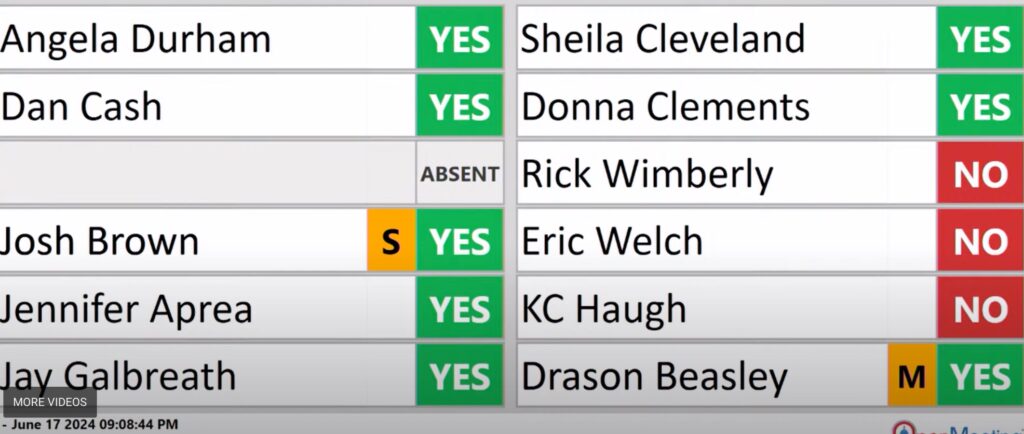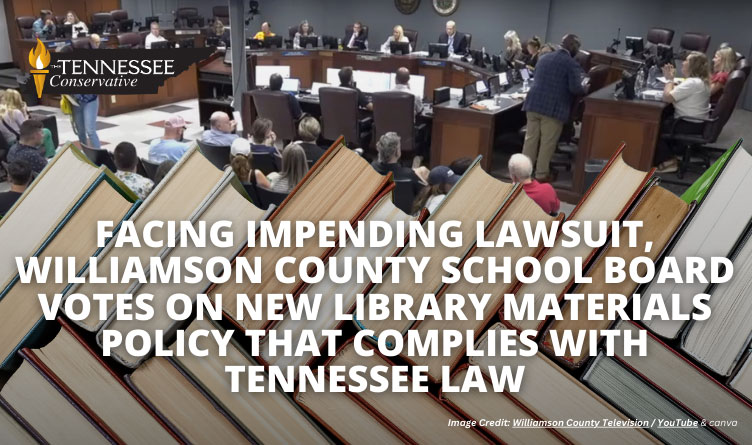Image Credit: Williamson County Television / YouTube & Canva
The Tennessee Conservative [By Kelly M. Jackson] –
During this month’s meeting of the Williamson County Schools Board of education, discussion and a vote was taken on some changes to the existing library materials policies, in order for those policies to become compliant with new state laws that compel K-12 public schools to remove any and all age-inappropriate materials from their libraries.
Last year, a group of parents in Williamson County filed a petition to have 5 books that sit on middle and high school shelves removed due to their inclusion of what is, according to the law, arguably obscene content.
Parents were forced to resort to this measure because the policy utilized by Williamson County Schools, according to the petition, is inadequate and falls short of what is required in Tennessee law.
The Age-Appropriate Materials Act of 2022 requires that materials that are made available in school libraries and in classrooms be put through a procedure on a regular basis, and particularly when a qualified “stakeholder” raises an issue with any of those materials.
The law states that a board of education must formulate a policy that includes specific criteria in order for it to have the desired effect of the legislation. In this case, that effect ideally would be an audit of sorts of the material in a school library, and possibly classrooms, and locate and remove any material that is determined by a review as inappropriate.

Williamson County Schools does have a district policy it uses to evaluate the materials that are raised by concerned parents, however the petition filed in Williamson County Chancery Court, contends that, procedurally, it deviates from the legal standard put forth in the language of the statute, and therefore violates state law.
The current policy, Policy 4.403 falls short because while it designates what material standards must be met and who makes that evaluation, it fails to establish a procedure librarians and teachers are to follow to conduct the mandatory review the law requires for districts in the state to remain in compliance.
The changes to the policy that were made can be reviewed at this link.
In order for the school library materials policy to be compliant, much of the new policy has the language from the new law specifically regarding definitions, included in the policy, with a caveat: The definitions (a-g) provided above are included to solely to track specific state law requirements that become effective July 1, 2024. Should these provisions be eliminated from state law requirements, whether by legislative amendment or action of a court of competent jurisdiction they shall be considered eliminated from this policy effective as of the date of such change in the law.”

Several members of the current school board expressed reservations and seemed to take umbrage with the necessity for making the changes.
Eric Welch, Rick Wimberly, and KC Haugh all voted against passing the new policy because they felt that the policy the school already has is sufficient for the needs, is inferior to the new policy (which means inferior to the law that was passed at the state level) and as Welch stated, “is very certain it is unconstitutional”.
Welch then read off a long list of books the new policy may effectively pull from the school library shelves, which included works from authors such as Hemingway, Hawthorne, Joyce, Bradbury, Shakespeare, Steinbeck and “the holy works of the world”, including the Bible.
Welch concluded that he would be voting no because he didn’t want to put his name on anything that “bans books”.
However, based on our previous reporting, the actual books that were of concern and the focus of the lawsuit are as follows:
• “The Perks of Being a Wallflower” by Stephen Chbosky
• “Where the Crawdads Sing” by Delia Owens
• “Speak” by Laurie Halse Anderson
• “The Field Guide to the North American Teenager” by Ben Philippe
• “Extremely Loud and Incredibly Close” by Jonathan Safran
• “What Girls Are Made Of” by Elana K. Arnold
• “Leah on the Offbeat” by Becky Albertalli
• “Sold” by Patricia McCormick
• “Tricks” by Ellen Hopkins
• “Lucky” by Marissa Stapley
• “Yolo” by Lauren Myracle
• “Deogratias” by Jean-Philippe Stassen, which the lawsuit says is also available at Brentwood Middle School
The books contain explicit descriptions of sexual activity, rape, incest, etc.
These are not the timeless classics that were mentioned by Welch, but rather, they include language and imagery that meets the state’s legal definition of obscene, and therefore do not have a proper place on K-12 library shelves.
The rest of the school board, save for the three mentioned previously, understood that the state law required compliance, and voted to adopt the policy changes.

The Tennessee Conservative will continue to cover this story as it continues to develop.
Watch the June 17th meeting of the Williamson County Board of Education below:


About the Author: Kelly Jackson is an escapee from corporate America, and a California refugee to Tennessee. Christ follower, Wife and Mom of three amazing teenagers, she has a BA in Comm from Point Loma Nazarene University, and has a background in law enforcement and human resources. Since the summer of 2020, she has spent any and all free time in the trenches with local grassroots orgs, including Mom’s for Liberty Williamson County and Tennessee Stands as a core member. An outspoken advocate for parents rights, medical freedom, and individual liberty, Kelly also has a YouTube channel @Tennessee_Truth_Teller and is planning on expanding out to other channels soon. Kelly can be reached at kelly@tennesseeconservativenews.com.



5 Responses
What does the “S” mean on the side of Josh Brown’s vote mean? Also the “M” on the side of Drason Beasley’s vote mean?
Likely means “Motion” and “Second”. Didn’t watch the video, but you may be able to tell if Beasley made the motion to consider and vote on policy and Brown made the required second to allow discussion and a vote.
Thank you Kelly Jackson. Your articles are great!!!!
Welch and Wimberly are definitely Leftists. It looks like Haugh is too.
So Wimberly, Welch, and Haugh revealed themselves as pedophiles or pedophile enablers, essentially the same thing. Roger that.
As a former librarian and as a former of the American Library Association, the Tennessee Library Association, the Massachusetts Library Association, the New England Library Association, the Association of College and Research Libraries, the Social Responsibility Roundtable’s Peace and Information Task Force, I am four-square opposed to censorship. I admire those librarians who have the courage to stand up to pseudo-parent groups like the Moms For Liberty (many of whom are not moms, much less moms who have their kids enrolled in public schools), the Proud Boys, and other thugs. They have more guts than the above bullies who attempt to intimidate them.